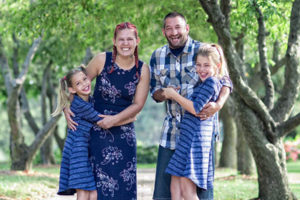How Does KVC Kansas Help Families Reunify After Foster Care?

When a court rules a child must be removed from their home, it’s heartbreaking — but necessary for the child’s safety and wellbeing. Ultimately, the goal of foster care is reunification (also known as reintegration), and equipping biological parents with the resources and skills they need to thrive is at the heart of it all. Let’s explore the significance of family reunification and how KVC Kansas supports biological parents in bringing their children back home.
Why It’s Ideal for Children to Remain with Biological Parents
We are all a part of family systems, and even when families are experiencing difficulties, many aspects of our family compose our identities. Our culture, language and belief systems, along with the social connections embedded in community, school, churches and extended family are all a very powerful part of who we are. “If we are able to maintain the connection to biological families, we can build on healthy loving relationships and keep the child with their larger support systems,” explains Dr. Linda B. Bass, PhD, LCMFT, President of KVC Kansas.
For this reason, it’s ideal for children to be reunited with their biological parents when it’s safe, even after a negative event or trauma has occurred. “Many children are entering foster care because one or both parents are struggling with a mental illness or an untreated substance use addiction, and children may have been placed in unsafe situations because of those conditions,” explains Bass.
Linda Bass, President of KVC Kansas
“However, if we can find a way to address these issues and support the parents, they can once again be safe, healthy and loving parents for their children,” said Bass.
How KVC Helps Families Reunify After Foster Care
 One key responsibility of a KVC case manager is working with the biological family to identify their needs. Then they create goals related to those needs so children can come home safely. However, it’s also a priority to work with the child who has experienced abuse or neglect to make sure their physical, mental and behavioral health needs are met while they’re safe in foster care. Both are necessary for the family reunification to be successful.
One key responsibility of a KVC case manager is working with the biological family to identify their needs. Then they create goals related to those needs so children can come home safely. However, it’s also a priority to work with the child who has experienced abuse or neglect to make sure their physical, mental and behavioral health needs are met while they’re safe in foster care. Both are necessary for the family reunification to be successful.
So much emphasis is placed on children’s health and safety, and rightfully so. However, to truly address the concerns that necessitate foster care, birth parents need access to support and resources too. “KVC recognizes that parents have a lot of unmet needs, which is why we have built additional services beyond what is required of a foster case management provider,” Bass explains. “We want to make sure parents don’t get stuck by not having health insurance or long service waitlists to prevent them from receiving much-needed care.”
Family Strengthening and Reunification Support Programs
Many factors contribute to the need for children to enter foster care. Therefore, KVC must consider services and treatment plans from many angles. Then incorporate successful interventions promptly so parents and children can stabilize and reunify.
To address any mental health and/or substance use disorder needs that children or caregivers have while involved with child welfare, KVC Kansas’ outpatient behavioral health services department is available to help. The outpatient services team offers a variety of services, including psychological testing for parents and children, individual and family therapies, medication management, and substance use treatment. These services are all geared toward helping clients process trauma, resolve conflicts and achieve mental wellness.
KVC also offers additional programs to support families such as a batterers intervention program, CONNECT Parent Groups and Kansas PMTO. These programs are available to all kinds of families – no child welfare involvement is required. Resources specific to parents whose children are currently or previously in foster care include KVC’s Engaging Parents Workgroup and the parent mentor program.
Shaping Programs with Biological Parent Voices

Members of the Engaging Parents Workgroup share their stories and advice with foster parents during KVC’s annual Resource Family Conference.
KVC’s Engaging Parents Workgroup invites parents and caregivers who have first-hand foster care and child welfare system experience to participate in the information and designing of programs that will benefit parents, caregivers and families. KVC Kansas President, Linda Bass, leads meetings each month and members review policies, develop new practices and host events for other parents and caregivers.
An offshoot of the Engaging Parents group has developed into a parent mentorship program that connects parents with children currently in foster care to parents who have reunited with their children successfully. While new, the program is already resulting in excellent outcomes. Biological parents experience the joy of learning from others who have been in their shoes before. Mentors are available for calls, in-person get-togethers and other connections as yet another service and tool for parents.
All of these resources and supports aim to empower biological parents and strengthen their support system to guide them to reunification.
Hard Work, Resilience & A Family’s Joyful Return
Kassi M., a biological parent whose children experienced foster care, successfully reunited with her two girls after they were placed into foster care. Previously, she felt stuck in a repeating cycle of drug use, abuse and neglect that led to the eventual removal of her daughters. The girls lived with a kinship caregiver while Kassi and her husband worked with KVC case managers, counselors and treatment providers to get the help to safely reunify with their girls.
As a team, Kassi and her husband used the resources available to them and did what they needed to do to return to their children. Together, they stopped drug use, got into treatment programs with KVC, joined a church and began volunteering for places like the Salvation Army and other organizations. Finally, Kassi was able to secure a job that was supportive of her situation and progress.
After about six months of positive and consistent improvement and a job upgrade, reintegration began. To ease back into life with her girls, they were allowed to stay together four nights out of the week and then return to their foster placement for three nights. When the official family reunification was successful, it was a whirlwind of activity, ensuring the children would have everything they needed and that the girls would be safe and sound. But each member of the family was glad to be back together again.
Kassi Gives Back to Families on Their Journey Toward Reunification
Today, Kassi works at Kansas Family Advisory Network as her primary occupation. She works with other foster and kinship families. Kassi also divides her time as a parent mentor through KVC’s Parent Mentorship program, a kinship advocate, co-chair for the Family First council, a member of the CFSR, a member of the KVC Engaging Parents workgroup, and several other groups. In each situation, she encourages others by drawing from her personal experiences.
Kassi has advice for biological parents hoping to reunite with their children:
“At times, things are going to get frustrating,” said Kassi. “But you have to have patience and know what you’re fighting for. You’re fighting for a purpose, and at the end of it all, you’ll see that it’s all worth it.”
Why Foster Parents Must Partner with Birth Parents
 One of the best outcomes to strive toward is building a bridge between foster and birth families. Currently, KVC helps form these connections through foster parent training and in-person meetings. During the initial stages, foster parents begin their journey with extensive training.
One of the best outcomes to strive toward is building a bridge between foster and birth families. Currently, KVC helps form these connections through foster parent training and in-person meetings. During the initial stages, foster parents begin their journey with extensive training.
In this training, teachers lead discussions about what biological parents may have experienced before, during and after their children were removed from their home. Many birth parents may have experienced trauma, often as children, and lacked a strong family support system. These experiences, along with other factors, contribute to the need for foster care. These discussions ensure foster parents practice empathy for birth families and work hard to understand their unique situations.
There’s also a series of opportunities for families to connect. This allows birth parents to share information about their child with foster parents. This information might include:
- Children’s normal routines
- Likes and dislikes
- Medical or allergy information
- Specific fears or comfort items
- Other vital information
This information can help to ease the family’s transition into foster care. During the same visit, foster families can share about themselves. This can help settle each family’s nerves and provide the best care possible. Maintaining open communication and understanding that family reunification is a team effort is vital. Teamwork helps keep another loving and supportive family in children’s lives.
Foster Parents and Biological Father Create a Loving Extended Family
 Bass recalls a situation in which a foster family went above and beyond. They worked to create opportunities for connection with the biological father of the children in their care. They invited him to many events, including basketball games, holidays and other activities. This made the father feel included and created a special bond between foster and biological parents.
Bass recalls a situation in which a foster family went above and beyond. They worked to create opportunities for connection with the biological father of the children in their care. They invited him to many events, including basketball games, holidays and other activities. This made the father feel included and created a special bond between foster and biological parents.
Since reunification, the foster parents have remained a supportive, loving extended family for the father and his children. The children even spend a week in the summer with their former foster family! “This is the highest goal we have for each foster care situation,” Bass emphasizes.
KVC strives for each foster care journey to be just as successful. Learn more about KVC Kansas’ family reunification services and read more reunification success stories.


